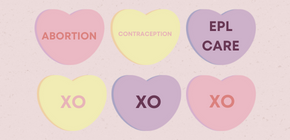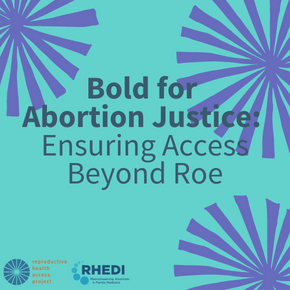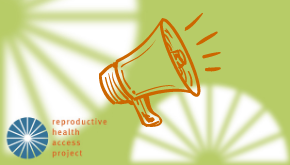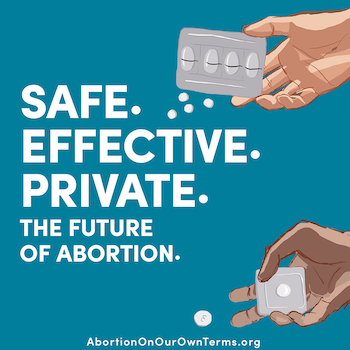Nov 06

Help Us Protect Access to Sexual and Reproductive Health Care Today!

Valentine’s Day is right around the corner and this year you can help expand access to reproductive health care AND wish that special someone in your life a Happy Valentine’s Day too! Your gift will help train and support clinicians to provide compassionate, comprehensive reproductive health care. Make a donation of $25 or more by February 14th and we will send a Valentine’s Day e-card to a special person in your life.
There has been an unprecedented amount of legislation attacking abortion access and rights in the last year. If abortion becomes more restricted than it already is, or outright illegal in some states, accessing abortion care will be even more difficult for people that already have little to no access. More people will be forced to travel to states where abortion remains legal. Clinicians all across the country need to be prepared to take action to avoid further delays of care – this means more clinics and most of all, more trained abortion providers. Training abortion providers who are willing and able to speak openly about providing abortions and the reasons why they’re so important has never been more crucial.
Make your gift of $25 or more today. By making a contribution to RHAP, you are celebrating a special person in your life and improving access to abortion, contraception, and early pregnancy loss care across the United States.

January 22nd marked the 49th anniversary of Roe v. Wade, the landmark Supreme Court decision that established legal abortion across the United States.
RHAP and RHEDI started as one organization based in New York City called the Access Project. For over twenty years, we have been honoring the Roe v. Wade court decision by gathering with our local New York City colleagues – the clinicians, nurses, medical assistants, social workers, administrators, advocates, everyone we worked alongside every day. We relished being together and having the opportunity to thank each other for doing this important work. In 2005 when the Access Project split into two organizations, we kept up the tradition of co-hosting an annual Roe v Wade celebration.
We know that by the end of this year, the protections guaranteed under Roe may no longer exist. While Roe has been the law of the land for nearly half a century, we acknowledge that it never fully ensured that abortion care is accessible to all, particularly communities that already experience disproportionate barriers to accessing health care. Barriers like the Hyde Amendment, parental consent laws, bans on medication abortion, gestational limits, regulations targeted at abortion clinics and providers and much more, combined with racial, economic, and immigration injustices, have meant that abortion has always been out of reach for far too many communities.
This year’s Roe celebration, held via zoom, brought together nearly 170 colleagues and supporters of both organizations from around the country. The event focused on the need to expand the fight for abortion access beyond Roe v. Wade. We hosted a panel discussion that highlighted five primary care abortion providers, Maya Bass, Mallory Klocke, Bhavik Kumar, April Lockley, and Jamie Phifer, each offering their take on the current challenges, highlighting opportunities for expansion, and sharing important considerations to ensure that this work is sustainable and equitable.
As we await the Supreme Court’s decision in Dobbs v. Jackson Women’s Health in June, the 15-week ban out of Mississippi that will likely decide the fate of legal abortion access in our country, the work of our organizations is more important than ever.
Everyone – especially people of color, LGBTQIA+ people, young people, immigrants, and those working to make ends meet – should be able to access comprehensive reproductive health care, including abortion care, in their own communities, free from barriers, stigma, and shame. This is why, as we head into an uncertain time, our organizations are committed to meeting the needs of clinicians on the ground, so that they can provide the best care possible to their patients regardless of what state and community they practice in. Supporters donated $3,178.45 which is being split between RHAP and RHEDI and will go to furthering both organizations’ work to expand access to abortion care.
Thank you!

“As a family medicine resident in a purple state, taking an active role in RHAP and advocating for abortion access has never felt more impactful. In my role as AAFP Liaison, I coordinated a workshop for other [Family Medicine] residents to practice writing and submitting testimony, and created a step-by-step guide to help streamline the process.” – Chelsea Daniels, MD | AAFP Liaison for the North Carolina Cluster
In early January advocates in our Reproductive Health Access Network began preparing testimony for the American Academy of Family Physicians’ (AAFP) virtual Congress of Delegates. The Congress of Delegates is an annual meeting where the AAFP, one of the largest professional organizations in medicine, crafts and enacts policies that shape the family medicine field and impact the communities family physicians serve. Clinicians and students from across the country mobilized virtually to advocate for comprehensive reproductive health care and justice. The six resolutions our RHAP organizing efforts focused on included: Informed Consent for Drug Screening in Pregnancy, Against Criminalizing People Who Obtain an Abortion Across State Lines, FDA Approval of HPV for Patient Self-Test, and End the Hyde Amendment (1) (CA, MI, and NY chapter versions).
Drawing upon our experience with the virtual 2020 Congress of Delegates, our Regional Clinical Network Leaders mentorship team supported Network advocates to amplify opportunities for AAFP members to share their voice. Over 250 written comments were submitted in support of our six prioritized resolutions. Despite some technical difficulties, 18 Network members from 13 states provided oral testimony. As state legislative sessions begin to get into full swing–presenting new threats to and opportunities for abortion access and other health equity issues–I am excited for our family physician advocates to continue to wield the platform of the AAFP, and for other Network advocates, including advance practice clinicians and internal medicine physicians, to leverage their professional organizations for health equity priorities critical to their patients, communities, and colleagues.

Throughout 2021, RHAP worked within the American Public Health Association’s (APHA) Sexual and Reproductive Health section to propose a policy statement urging APHA to publicly back decriminalizing and supporting self-managed abortion. In November, with support from a variety of APHA sections outside of reproductive health, the APHA adopted our policy statement, which is now available for all to access. The statement asks APHA and members, public health professionals, clinicians, and elected officials to denounce the criminalization of self-managed abortion and work toward guaranteeing safe and equitable access to the full range of safe abortion care options.
“Self-managed abortion is safe, effective, and empowering.” Self-managed abortion, or SMA, presents an important alternative to clinical care for those who face financial and logistical barriers due to state and federal abortion restrictions, or who prefer this method due to its privacy, comfort, or convenience. The prevalence of self-managed abortion is higher among Black and Hispanic women* compared to white women, indicating that they face greater barriers to accessing clinical abortion care or prefer self-managed abortion due to experiences of structural racism and discrimination in health care. Self-managed abortion with pills – mifepristone and misoprostol, or misoprostol alone – is extremely safe and effective. In fact, both methods are no less effective than medication abortion in clinical settings, according to the SAFE Study.
Self-managed abortion is an issue of human rights and reproductive justice: providing people with the tools and information to manage their abortion enables them to exercise their bodily autonomy and to be in control of their health and well-being. In response to issues of criminalization and the failure of governments to provide safe abortion care, feminist medication abortion accompaniment models have emerged around the world to provide people with the information, support, and resources they need to manage their abortion, free from stigma. These community-based, grassroots collectives have demonstrated time and time again that they effectively and compassionately support individuals to self-manage their abortions, and connect people to clinic-based care in the rare cases this may be needed.
RHAP believes all people should have access to the full range of safe abortion options, including self-managed care, to end a pregnancy safely and with dignity on their own terms. RHAP is proud to offer educational resources on having an abortion with pills and looks forward to continued work and reflection on the role primary care clinicians play in the movement for self-managed abortion.
Your gift allows us to train and support health care providers across the United States so they can offer patients compassionate and comprehensive care.
Nov 06
